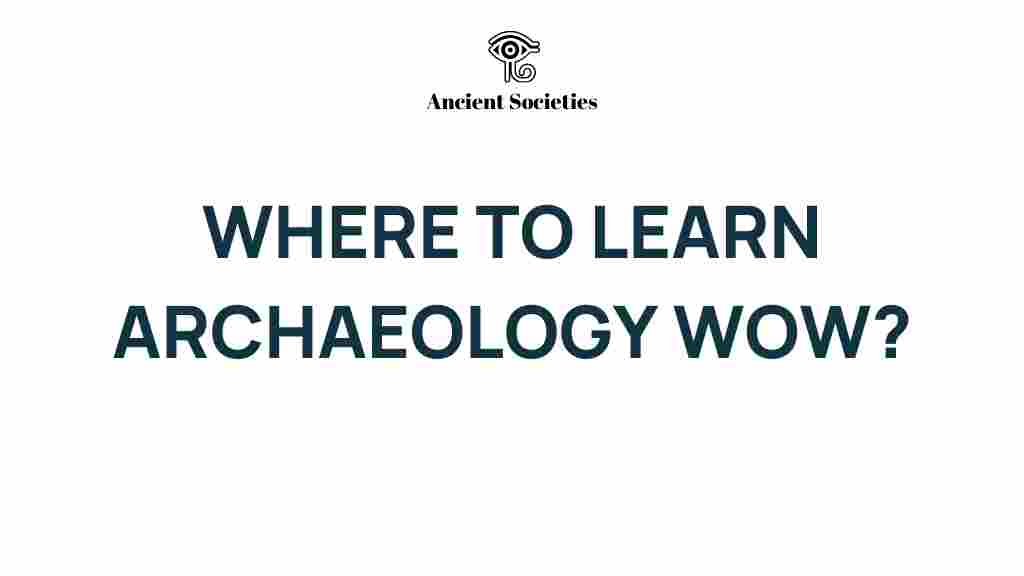Unlocking the Secrets of Archaeology: Where to Begin Your Journey
Archaeology is a fascinating field that allows us to explore the depths of human history and cultural heritage. Whether you’re an aspiring archaeologist, a curious student, or someone with a passion for historical exploration, embarking on a journey in archaeology can be incredibly rewarding. This article will guide you through the essential steps to begin your journey in archaeology, focusing on learning, education, and community engagement.
Understanding Archaeology
Before diving into the practical aspects of archaeology, it’s crucial to understand what archaeology entails. Archaeology is the scientific study of human history and prehistory through the excavation of sites, analysis of artifacts, and exploration of cultural heritage. It combines elements of history, anthropology, and even environmental science to provide insights into how ancient societies lived, interacted, and evolved.
Step 1: Exploring Your Interests in Archaeology
To embark on your journey in archaeology, start by exploring your interests. Archaeology encompasses various subfields, including:
- Prehistoric Archaeology: Focuses on societies before written records.
- Historical Archaeology: Studies societies with written documentation.
- Classical Archaeology: Concentrates on ancient civilizations such as Greece and Rome.
- Underwater Archaeology: Involves the study of submerged sites and artifacts.
- Industrial Archaeology: Examines the material culture of the industrial era.
Identifying your specific interests within archaeology can guide your educational and practical steps moving forward.
Step 2: Pursuing Education in Archaeology
Formal education is a vital component for anyone serious about a career in archaeology. Here are some educational paths you can consider:
- Undergraduate Degrees: Many universities offer bachelor’s degrees in archaeology, anthropology, or related fields. These programs typically cover foundational knowledge and methodologies in archaeology.
- Graduate Studies: Pursuing a master’s or Ph.D. in archaeology can specialize your knowledge and open up advanced career opportunities. Graduate programs often include fieldwork, research projects, and thesis work.
- Online Courses: Many institutions provide online courses that cover various archaeological topics, making learning accessible regardless of your location. Websites like Coursera and edX offer numerous options.
Step 3: Engaging with Online Resources
The digital age has opened up a wealth of resources for learning about archaeology. Here are some valuable online resources to consider:
- Online Courses: Platforms such as Coursera, edX, and FutureLearn offer courses in archaeology and related subjects.
- Webinars and Lectures: Many universities and organizations host free webinars and lectures on archaeological topics.
- Podcasts and Documentaries: Engaging with educational podcasts and documentaries can provide insights into archaeological discoveries and discussions.
- Academic Journals: Reading journals like “American Antiquity” or “Journal of Archaeological Science” can keep you updated with the latest research and methodologies.
Step 4: Getting Hands-On Experience through Fieldwork
Fieldwork is one of the most exciting aspects of archaeology. It involves excavating sites, analyzing artifacts, and experiencing the thrill of discovery firsthand. Here’s how you can get involved:
- Join Archaeological Digs: Many universities and organizations run summer excavation projects that welcome volunteers. These digs offer invaluable hands-on experience.
- Internships: Seek internships with museums, cultural heritage organizations, or archaeological firms to gain practical experience.
- Field Schools: Participating in a field school is an excellent way to gain formal training in excavation techniques and archaeological practices.
Step 5: Building a Community in Archaeology
Engaging with a community of like-minded individuals can enhance your learning experience. Here are some ways to connect with others in the field:
- Join Professional Organizations: Consider joining organizations such as the Society for American Archaeology (SAA) or the Archaeological Institute of America (AIA). Membership often includes access to resources, conferences, and networking opportunities.
- Participate in Local Archaeology Projects: Many local historical societies and museums offer opportunities to volunteer or participate in projects.
- Attend Conferences: Archaeology conferences provide opportunities to learn about the latest research, meet professionals, and network with others in the field.
Troubleshooting Common Challenges in Learning Archaeology
As you embark on your journey into archaeology, you may encounter some challenges. Here are some common issues and solutions:
- Feeling Overwhelmed by Information: Archaeology is a vast field. Focus on specific topics that interest you and gradually expand your knowledge.
- Limited Access to Fieldwork Opportunities: If local opportunities are scarce, consider participating in online field schools or virtual excavations.
- Budget Constraints: Many online resources and courses are free or low-cost. Look for scholarships or funding opportunities for field schools and workshops.
Step 6: Embracing Cultural Heritage
Understanding and appreciating cultural heritage is at the heart of archaeology. As you learn, consider the following:
- Respect Local Communities: When engaging in archaeology, it’s essential to work respectfully with local communities. Acknowledge their histories and perspectives.
- Advocate for Preservation: Promote the preservation of archaeological sites and cultural heritage in your community.
- Support Ethical Practices: Familiarize yourself with ethical guidelines in archaeology, such as those outlined by the Society for American Archaeology.
Step 7: Lifelong Learning in Archaeology
Archaeology is a constantly evolving field, and lifelong learning is imperative. Engage in continuous education through:
- Workshops and Seminars: Attend workshops to learn about new technologies and methods in archaeology.
- Reading and Research: Keep reading journals, articles, and books to stay informed about the latest archaeological discoveries and theories.
- Networking with Professionals: Building relationships with professionals in the field can provide mentorship opportunities and insights into career paths.
Conclusion: Your Archaeological Adventure Awaits
The journey into archaeology offers endless opportunities for learning, discovery, and engagement with cultural heritage. By following these steps and utilizing the available resources, you can unlock the secrets of archaeology and embark on an adventure that connects you with the past. Embrace the challenges, celebrate the discoveries, and contribute to the legacy of human history.
For more detailed insights on archaeological practices and discoveries, consider checking out the resources available at the Archaeological Institute of America. Remember, the world of archaeology is vast and full of wonders waiting to be explored!
This article is in the category Archaeology and created by AncientSocieties Team
